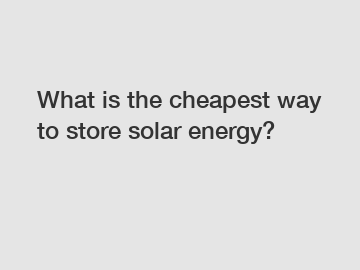Feb. 05, 2024
Energy
What is the Cheapest Way to Store Solar Energy?
In a world where renewable energy sources are gaining popularity, solar power stands tall as one of the most promising options. With abundant sunshine available, the challenge lies in harnessing and storing this energy efficiently. So, what is the cheapest way to store solar energy? Let's dive into this topic and explore the various methods and technologies that offer cost-effective solutions.
1. Battery Storage.

Battery storage systems have become a popular choice for storing solar energy. Lithium-ion batteries, the dominant technology in this field, offer high energy density, long lifespan, and flexibility. These batteries can absorb excess energy produced during sunny periods and provide it when sunlight is limited. The decreasing costs of lithium-ion batteries make them an appealing option for many homeowners and businesses. Additionally, advancements in battery technology are being made, which are expected to lower costs further in the coming years.
2. Pumped Hydroelectric Storage.
Although not directly related to solar energy, pumped hydroelectric storage systems have proven to be a cost-effective way for large-scale energy storage. This method involves using excess solar power to pump water to a higher elevation, storing potential energy. When energy demand spikes, the stored water is released to flow downhill, generating electricity through turbines. Compared to other large-scale storage options, pumped hydroelectric storage provides a relatively low-cost solution.
3. Compressed Air Energy Storage (CAES).
CAES is another promising option for storing solar energy. It involves compressing air using excess electricity generated from solar panels and storing it in underground caverns. When energy demand increases, the compressed air is released, driving turbines and generating electricity. Although capital costs are relatively high, the operational costs of CAES are low, making it an attractive choice for long-term energy storage.
4. Thermal Energy Storage.
Thermal energy storage (TES) utilizes the heat generated by solar power for later use. There are various TES methods, including molten salt and phase-change materials. Molten salt, comprising a mixture of sodium nitrate and potassium nitrate, can hold heat at high temperatures for prolonged periods. During the day, solar energy heats the salt, and it releases the stored heat when needed, such as during the night or cloudy periods. Phase-change materials, on the other hand, absorb and release heat during the phase transition, providing an efficient and cost-effective way to store thermal energy.
5. Hydrogen Energy Storage.
One innovative method gaining attention is hydrogen energy storage. Excess solar energy is used to split water molecules into hydrogen and oxygen through the process of electrolysis. The hydrogen gas can then be stored separately in tanks and used later in fuel cells to generate electricity. While hydrogen storage offers long-term energy storage potential, the technology is still in its early stages and requires further advancements to become a truly cost-effective solution.
In conclusion, the cheapest way to store solar energy depends on various factors such as the scale of storage, location, and intended usage. Battery storage, pumped hydroelectric storage, compressed air energy storage, thermal energy storage, and hydrogen energy storage are among the most promising options available. With ongoing advancements in technology, prices are expected to decrease, making solar energy storage more affordable and accessible for both residential and commercial applications. As our world increasingly embraces renewable energy, finding cost-effective ways to store solar energy will play a vital role in creating a sustainable future.
Are you interested in learning more about high voltage lithuim battery price, hybrid storage inverter, Single phase string inverter for residential solar installations? Contact us today to secure an expert consultation!
If you are interested in sending in a Guest Blogger Submission,welcome to write for us!
All Comments ( 0 )